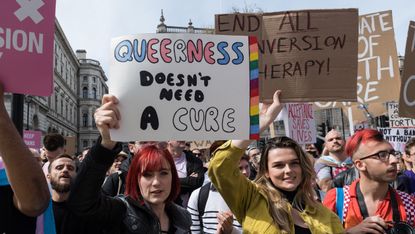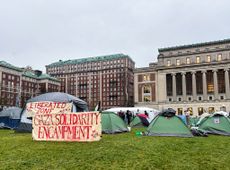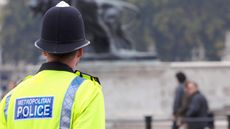The countries that have banned conversion therapy
Former PM Theresa May has urged UK government to ban practice for transgender people

Theresa May has said there were times she “would have voted differently” on LGBTQ+ issues during her parliamentary career as she urged the government to ban all forms of conversion therapy.
Writing for the i news site, the former prime minister called on Boris Johnson’s administration to “keep its commitment to consider the issue of transgender conversion therapy”, adding that the matter “must not be allowed to slide” off the political agenda.
May previously voted against reducing the age of homosexual consent from 18 to 16 in 1998 but her attitude towards LGBTQ+ rights has since changed. During her time as prime minister, she promised to ban conversion therapy, a practice that attempts to suppress a person’s sexuality or gender identity.
Subscribe to The Week
Escape your echo chamber. Get the facts behind the news, plus analysis from multiple perspectives.

Sign up for The Week's Free Newsletters
From our morning news briefing to a weekly Good News Newsletter, get the best of The Week delivered directly to your inbox.
From our morning news briefing to a weekly Good News Newsletter, get the best of The Week delivered directly to your inbox.
In March, Johnson dropped plans to ban the practice of all forms of conversion therapy, a controversial decision that led to a “backlash from the LGBT community and negative reaction from Tory MPs”, said The Telegraph.
The PM had previously described conversion therapy as an “absolutely abhorrent” practice that “has no place in a civilised society and has no place in this country”. Pundits suggested his new position was linked to his attempts to “shore up support from the party’s Right” following calls for his resignation as a result of the Partygate scandal.
Johnson later reversed his decision and a subsequent Conversion Therapy Bill, outlined in this year’s Queen’s Speech, indicated that the government would ban the practice in “certain scenarios”, such as trying to change someone’s sexuality, but would not apply to transgender people.
Including gender in the legislation could have “unintended consequences”, said the BBC. This “might affect teachers, parents and therapists helping children who are struggling with their gender identity”.
What is conversion therapy?
Conversion therapy, which is sometimes also referred to as “reparative therapy”, tries to change someone’s sexual orientation or gender identity. That means that it tries to stop or suppress a person from being homosexual, or from living as a different gender to the sex recorded at their birth.
“It can include talking therapies and prayer,” said the BBC, “but more extreme forms can include exorcism, physical violence and food deprivation.”
The NHS, the British Psychological Society and other professional bodies have said that all kinds of conversion therapy are “unethical and potentially harmful”.
Where is conversion therapy illegal?
Brazil introduced a “trailblazing ban” on conversion therapy relating to sexual orientation in 1999, said the LGTBQ+ rights charity Stonewall. This was the world’s first conversion therapy ban, and it was expanded to cover gender identity in 2018.
Around 16 countries – including Samoa, Fiji, Taiwan, Argentina, Uruguay, Ecuador, Malta and Germany – have introduced some form of ban on conversion therapy. And many other states, cities and provinces are introducing legislation, according to the BBC.
New Zealand is the most recent country to pass new laws banning conversion therapy, introducing two criminal offences in February for attempts to change the sexual orientation, gender identity or gender expression of anyone under 18.
Meanwhile, countries including Ireland, Israel, Norway, Denmark and Finland are all currently looking at measures to ban conversion therapy, or are launching consultations.
Create an account with the same email registered to your subscription to unlock access.
Sign up for Today's Best Articles in your inbox
A free daily email with the biggest news stories of the day – and the best features from TheWeek.com
-
 'Republicans want to silence Israel's opponents'
'Republicans want to silence Israel's opponents'Instant Opinion Opinion, comment and editorials of the day
By Harold Maass, The Week US Published
-
 Poland, Germany nab alleged anti-Ukraine spies
Poland, Germany nab alleged anti-Ukraine spiesSpeed Read A man was arrested over a supposed Russian plot to kill Ukrainian President Zelenskyy
By Peter Weber, The Week US Published
-
 Today's political cartoons - April 19, 2024
Today's political cartoons - April 19, 2024Cartoons Friday's cartoons - priority delivery, USPS on fire, and more
By The Week US Published
-
 Death of first non-binary judge in Mexico instils fear in LGBTQ+ community
Death of first non-binary judge in Mexico instils fear in LGBTQ+ communityUnder the Radar Jesús Ociel Baena's suspected murder reveals dangers to transgender and non-binary people
By Harriet Marsden, The Week UK Published
-
 Shinzo Abe shooting: how common is gun crime in Japan?
Shinzo Abe shooting: how common is gun crime in Japan?Why Everyone’s Talking About Longest-serving PM dies from injuries after being shot while on campaign trail
By Kate Samuelson Published
-
 What putting Metropolitan Police in ‘special measures’ means for the force
What putting Metropolitan Police in ‘special measures’ means for the forceWhy Everyone’s Talking About Scotland Yard facing greater scrutiny and pressure to produce improvement plan following criticisms by watchdog
By Chas Newkey-Burden Published
-
 Maradona and the ‘simple homicide’ trial
Maradona and the ‘simple homicide’ trialWhy Everyone’s Talking About Prosecutors claim football legend’s death was result of ‘omissions’ by medics and a psychologist
By Chas Newkey-Burden Published
-
 David Amess murder trial: ‘harrowing’ details of attack play out in court
David Amess murder trial: ‘harrowing’ details of attack play out in courtWhy Everyone’s Talking About Emergency phone call by witness played to jury
By The Week Staff Published
-
 Can the Metropolitan Police rebuild public trust?
Can the Metropolitan Police rebuild public trust?Why Everyone’s Talking About Hunt for a police chief beings as Cressida Dick steps down from top job
By The Week Staff Last updated
-
 Is Levi Bellfield telling the truth about the Russell murders?
Is Levi Bellfield telling the truth about the Russell murders?Why Everyone’s Talking About Killer confesses to double murder that put another man behind bars for two decades
By The Week Staff Published
-
 Rap on Trial: the battle to keep lyrics out of courtrooms
Rap on Trial: the battle to keep lyrics out of courtroomsWhy Everyone’s Talking About Jay-Z among rappers backing legislation to stop defendants’ verses from being used against them
By Kate Samuelson Published